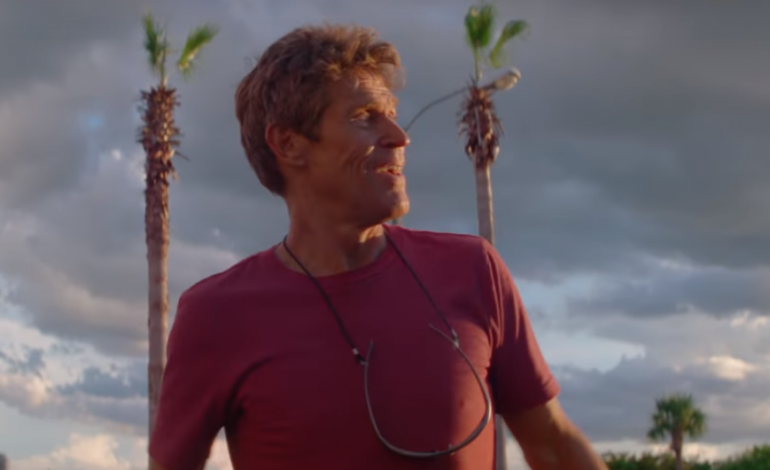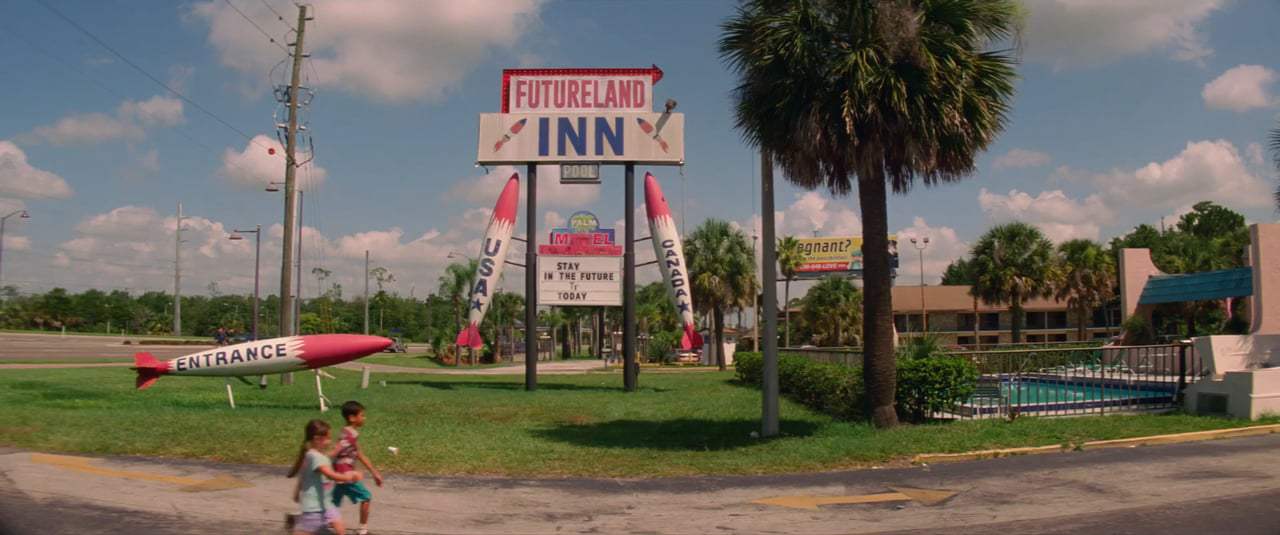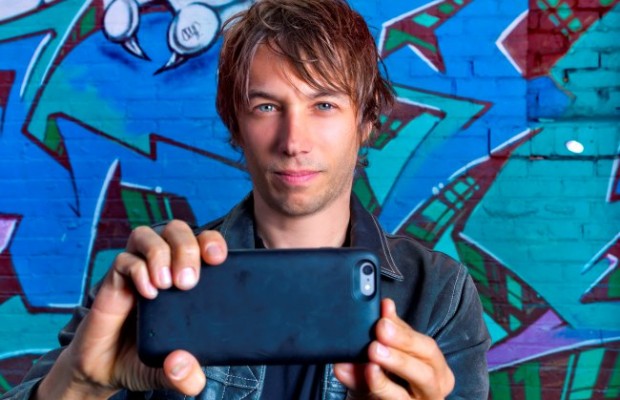 |
| Motel life. Bria Vinaite in The Florida Project |
Fuuuck you! Lest we miss these final, flagrant word from Halley (Bria Vinaite) in Sean Baker's The Florida Project, the director practically inserts his camera into roaring mouth of the young woman. This close close up is both typical of Sean Baker the director and Sean Baker the humanist. There's arguably not much admirable to be found in Halley, but Baker lets her speak, or shout her piece. This before The Florida Project at its climax spins off into high and sad irony like a firework into the night sky.
One of our best and most valuable filmmakers, Mr. Baker continues to present us with the travails of those scrapping at the edges of the American economy and society, or at least those generally beyond the interest of politicians, demographers and the like. Read many reviews of the The Florida Project and you will regularly be served variations on the word margin. True enough, many of the characters in Baker's half dozen features operate, in a sense, on the margins of our greater culture. And yet. As with the director's previous films, set in New York and Los Angeles, there are cites within cities, very different realities existing almost side by side, often sharing the same squares of sidewalk and strips of asphalt. The close but yet so far - from prosperity or just more comfortable illusion - nature of the lives in The Florida Project might be the writer/director's saddest variation yet on the theme.
 |
| The leading ladies of Sean Baker's Tangerine |
Baker has proven rather a scrapper himself. If you've followed the man's career, if you have seen most or all of his films, it's a bit jarring to hear Cool and the Gang's exuberant "Celebration" while the white script of The Florida Project's opening credits appear. The rights to the song may well have exceeded the entire budget of Baker's previous Tangerine (2015), famously shot on iPhones.
Some of the invention and immediacy of Tangerine was borne of necessity. Baker had something like The Florida Project in mind after his excellent Starlet (2012), but lacked the funding to go forward. So, felicitously, the world got Tangerine, the story of two transgender sex workers in one of those cities within a city, an alternative Hollywood both bleak and vibrant. The warm reception and relative success of Tangerine brought Baker the means to shoot on location in Florida and employee a couple of professional actors.
One of the pros is Willem Dafoe, himself something of an overlooked national resource. Dafoe is Bobby Hicks, manager of the Magic Castle Motel, where Halley and her daughter Moonee (Brooklynn Prince) proceed with an existence very much out loud, if a bit tenuous. And there's old Willem, lean as ever as the motel manager, seemingly put upon by the many demands of job, employer and motley guests. Bobby Hicks defaults to his own ample humanism behind a pretty flimsy veil of gruffness. But as any man who would survive in his position, he knows when to harden, as when dealing with a would-be pedophile who shows up on the motel property and takes too close an interest in Mooney and a few other oblivious children.
Dafoe falls as richly into character as ever. And as Bria Vinaite tells it in interview, the veteran actor was both generous with advice and admirable in treating his inexperienced colleagues as equals on set. It is with those callow actors that Sean Baker has excelled throughout his career. That ability says a lot about Baker's professionalism under even the most modest of filming circumstances. It also speaks to the trust he's won from people of very disparate backgrounds and his willingness to immerse himself into any environment that he's chosen to depict.
Baker is exceptional not only with the nonprofessional actors from whom he draws impressively natural performances, but the manner in which he sometimes finds those performers. As with one of the minor characters in Tangerine, Baker found Bria Vinaite online, intrigued enough by her Instagram feed to offer her a role in his film.
There's any number of moments in The Florida Project in which someone as new to acting as Ms. Vinaite could get passably by on attitude. But Halley is a deeply incised enough figure that Vinaite must do more than flounce her way from scene to scene, a whirlwind of long limbs, a breastplate of tattoos, a mane than that descends to washed-out aquamarine and a ready floe of rude verbiage delivered in hand-me-down cadence and accent.
You might not see many more affecting things on film this year than Halley's face, regarding Moonee as she enjoys a relatively lavish breakfast. Particularly down on their luck, Halley sneaks the two of them into an adjacent hotel so her daughter can enjoy a good meal at its buffet. It's a moment when Halley's bravado, almost as permanent as those tattoos, is almost entirely stripped from her. She doesn't eat, but simply watches her daughter savor the food that might as well be the product of another planet, served as it is daily a short walk from the pink Magic Castle where they reside. Baker has Vinaite look directly into the camera, and she manages the sad, sobered, immemorial mask of a parent who knows she is failing her child.
You might not see many more affecting things on film this year than Halley's face, regarding Moonee as she enjoys a relatively lavish breakfast. Particularly down on their luck, Halley sneaks the two of them into an adjacent hotel so her daughter can enjoy a good meal at its buffet. It's a moment when Halley's bravado, almost as permanent as those tattoos, is almost entirely stripped from her. She doesn't eat, but simply watches her daughter savor the food that might as well be the product of another planet, served as it is daily a short walk from the pink Magic Castle where they reside. Baker has Vinaite look directly into the camera, and she manages the sad, sobered, immemorial mask of a parent who knows she is failing her child.
Like much of the juxtaposition in The Florida Project, Mooney is all childish abandon in contrast to her mother as she devours the offerings of the breakfast buffet. This just one of many scenes in which young Brooklyn Prince, a child actor from the Orlando area, shines and practically devours the camera amongst the raspberries and strawberries (not good to eat at the same time, she realizes), the pancakes and all else that make up her sitting.
The Florida Project does, in many ways, belong to Mooney and the talented 7-year-old who plays her. Baker has said that The Little Rascals was one of the influences for this story, which is framed by scenes of Mooney and friends running from one place to the next, just as the soundtrack returns to an instrumental version of "Celebration" at film's end. That Little Rascals element, the joy to be found in the hijinks of Mooney and the other motel children amid their hardscrabble lives lends The Florida Project its moments of charm and comedy.
 These lighter moments in The Florida Project are not simply a matter of trying to leaven a pretty flat expanse of dough, it's a lesson Baker apparently learned from his leads in Tangerine. Tough though life on the streets was for his characters (and actors), the film's stars, Mya Taylor and Kitana Kiki Rodriguez convinced Baker to include comedic anecdotes amid harsher realities, which speak, by extension to the characters' resilience and complexity. It's a common mistake of well-meaning (and not so well-meaning) directors - reduce a downtrodden person or people to sad creatures who can only sing the blues, and a single-note blues at that.
These lighter moments in The Florida Project are not simply a matter of trying to leaven a pretty flat expanse of dough, it's a lesson Baker apparently learned from his leads in Tangerine. Tough though life on the streets was for his characters (and actors), the film's stars, Mya Taylor and Kitana Kiki Rodriguez convinced Baker to include comedic anecdotes amid harsher realities, which speak, by extension to the characters' resilience and complexity. It's a common mistake of well-meaning (and not so well-meaning) directors - reduce a downtrodden person or people to sad creatures who can only sing the blues, and a single-note blues at that.
 These lighter moments in The Florida Project are not simply a matter of trying to leaven a pretty flat expanse of dough, it's a lesson Baker apparently learned from his leads in Tangerine. Tough though life on the streets was for his characters (and actors), the film's stars, Mya Taylor and Kitana Kiki Rodriguez convinced Baker to include comedic anecdotes amid harsher realities, which speak, by extension to the characters' resilience and complexity. It's a common mistake of well-meaning (and not so well-meaning) directors - reduce a downtrodden person or people to sad creatures who can only sing the blues, and a single-note blues at that.
These lighter moments in The Florida Project are not simply a matter of trying to leaven a pretty flat expanse of dough, it's a lesson Baker apparently learned from his leads in Tangerine. Tough though life on the streets was for his characters (and actors), the film's stars, Mya Taylor and Kitana Kiki Rodriguez convinced Baker to include comedic anecdotes amid harsher realities, which speak, by extension to the characters' resilience and complexity. It's a common mistake of well-meaning (and not so well-meaning) directors - reduce a downtrodden person or people to sad creatures who can only sing the blues, and a single-note blues at that.
Much as he was working with a budget that could apparently pay everybody involved in The Florida Proeject, Baker found out how a bigger army can be harder to marshal when he wanted to attack with the speed and relative invisibility of a film guerilla.
One of the ways in which Halley makes money is to buy knock-off designer perfume at wholesale stores and sell it to guests at more upscale hotels nearby. Baker's wanted to shoot Halley's attempts to sell the perfume to actual guests of the hotels and hopefully get signed releases after the fact. But he found it was very difficult to slyly observe any encounter between Bria Vinaite and an unsuspecting tourist while he had a fairly large crew lurked nearby. The director found his usual attempts at such spontaneity hamstrung by the needs of his continuity person and others on
the crew who needed to have a clear idea of what he planned ahead of
time.
Sean Baker's career has, after a fashion, paralleled that of filmmaker and film professor Ramin Barani. Like Baker's two New York-set films, Take Out (2004) and Prince of Broadway (2008), Bahrani's first two films, both essential viewing, involve stories of immigrants hustling to round up enough scraps from the city's massive economy to get by. As Bahrani graduated from Man Push Cart (2005) and Chop Shop (2007), to bigger budgets, he did so with with diminishing returns. Goodbye Solo (2008) is a lovely, aching transition from the heart and lyricism of Bahrani's New York immigrant films to those set in Iowa (At Any Price) and post-2008 Florida (99 Homes). With those two most recent films, there clearly was an attempt to construct bigger stories for a bigger audience, but the overheated plots left us with something not nearly as affecting as his earlier efforts.
In interview, Sean Baker has, on at least one occasion, likened his difficulties in making The Florida Project to those of Francis Ford Coppola with Apocalypse Now. Well...we'll forgive Mr. Baker, unaccustomed as he his with with a production of any size, for his lack of perspective. Had he attempted to shoot The Florida Project in, say...the Everglades...during a hurricane...while, perhaps...a small war broke out between locals....then, it might have been an apt comparison (if you haven't yet seen Hearts of Darkness, which chronicles Coppola's struggles in making Apocalypse Now, see it at once).
Fortunately, Sean Baker survived his bigger production with no loss of insight, compassion and the sense of immersion we have seen with his earlier films. Drive around Orlando, not so far from Disney and those other theme parks, and you might half expect to see Halley and Moonee going about their lives. And in sense, that's probably just what you would see if you ventured into the area's less desirable weigh stations, where those sunny pastel colors sheath the cinder block buildings and lives therein in a thick coat of irony.
The beaten up Magic Castle motel room of the mother and child seems all too real. As Mooney and her friends roam between properties, you repeatedly expect something bad to happen. This might be from nature, maybe getting too close to an alligator from a swampy area which the kids traverse by means of a makeshift plywood bridge. Or there are the dangers from man that seem to lurk, in the form of the pedophile or unseen squatters at a nearby abandoned development, whose empty buildings stand like pastel headstones amid rising grass. Moonee and her friends don't find any of the transient residents of the abandoned buildings, but do manage to set one of them on fire, something that Halley films on her phone with glee, while noting that the unexpected blaze is better than the Internet.
Ultimately, Hallee's hustling takes a more dubious turn, and the real danger awaiting these lives finally washes in. You might well say the feckless woman brought this on herself and her child, but that doesn't seem to be the director's point of view. In the Florida Project and elsewhere in his work, Sean Baker offers only a compassionate and through examination of the lives he chooses to illuminate. Throughout his half dozen features, there are drunk white guys (his first film, Four Letter Words), transgender sex workers of color and quite a lot humanity in between, constituencies various of us might find appealing, off-putting, worthy of our defense or scorn. Unlike so many voices contributing to the cacophony of our culture, conservative and and liberal alike, Sean Baker seems concerned not at all with politics, just people. And isn't that refreshing?
In interview, Sean Baker has, on at least one occasion, likened his difficulties in making The Florida Project to those of Francis Ford Coppola with Apocalypse Now. Well...we'll forgive Mr. Baker, unaccustomed as he his with with a production of any size, for his lack of perspective. Had he attempted to shoot The Florida Project in, say...the Everglades...during a hurricane...while, perhaps...a small war broke out between locals....then, it might have been an apt comparison (if you haven't yet seen Hearts of Darkness, which chronicles Coppola's struggles in making Apocalypse Now, see it at once).
Fortunately, Sean Baker survived his bigger production with no loss of insight, compassion and the sense of immersion we have seen with his earlier films. Drive around Orlando, not so far from Disney and those other theme parks, and you might half expect to see Halley and Moonee going about their lives. And in sense, that's probably just what you would see if you ventured into the area's less desirable weigh stations, where those sunny pastel colors sheath the cinder block buildings and lives therein in a thick coat of irony.
The beaten up Magic Castle motel room of the mother and child seems all too real. As Mooney and her friends roam between properties, you repeatedly expect something bad to happen. This might be from nature, maybe getting too close to an alligator from a swampy area which the kids traverse by means of a makeshift plywood bridge. Or there are the dangers from man that seem to lurk, in the form of the pedophile or unseen squatters at a nearby abandoned development, whose empty buildings stand like pastel headstones amid rising grass. Moonee and her friends don't find any of the transient residents of the abandoned buildings, but do manage to set one of them on fire, something that Halley films on her phone with glee, while noting that the unexpected blaze is better than the Internet.
Ultimately, Hallee's hustling takes a more dubious turn, and the real danger awaiting these lives finally washes in. You might well say the feckless woman brought this on herself and her child, but that doesn't seem to be the director's point of view. In the Florida Project and elsewhere in his work, Sean Baker offers only a compassionate and through examination of the lives he chooses to illuminate. Throughout his half dozen features, there are drunk white guys (his first film, Four Letter Words), transgender sex workers of color and quite a lot humanity in between, constituencies various of us might find appealing, off-putting, worthy of our defense or scorn. Unlike so many voices contributing to the cacophony of our culture, conservative and and liberal alike, Sean Baker seems concerned not at all with politics, just people. And isn't that refreshing?
Drive Route 192 through Kissimmee and Orlando, Florida and you'll see a good bit of tacky American past and present, illusion and reality, almost side by side at times, much as all of it tends to be colorfully clad. Director Sean Baker sends a devastated Moonee and a friend on a sad and fanciful sojourn at the conclusion of The Florida Project. It's like an earlier bittersweet trip arranged by Halley to witness Disney Fireworks from a good vantage point outside the boundary of the park. But Moonee and her friend make it this time, as that instrumental version of "Celebration" pipes with seeming triumph. And irony settles on these children, these lives, as ruthlessly as night.
db







Comments
Post a Comment